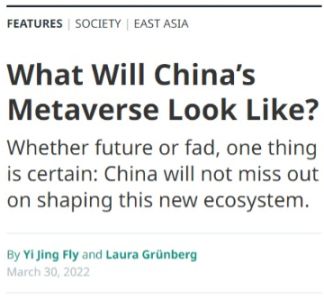
What Will China’s Metaverse Look Like?
Whether future or fad, one thing is certain: China will not miss out on shaping this new ecosystem.
Recommendation
Experts and pundits are scrambling to define how the metaverse will affect people and society, socially, mentally and financially. You may be getting meta déjà vu – Second Life had a very similar bout of hype in the mid-2000s – and the current publicity is much the same. But this time, virtual worlds are more likely to boast widespread adoption all over the world, and China won’t be left out. In this article from The Diplomat, Yi Jing Fly and Laura Grünberg describe the future of a metaverse with Chinese characteristics.
Summary
About the Authors
Yi Jing Fly works in brand strategy at Design Bridge. She is the author of “China Too Cool: Vernacular Innovations and Aesthetic Discontinuity of China.” Laura Grünberg offers consultancy for cross-border strategic communications mandates.








Comment on this summary